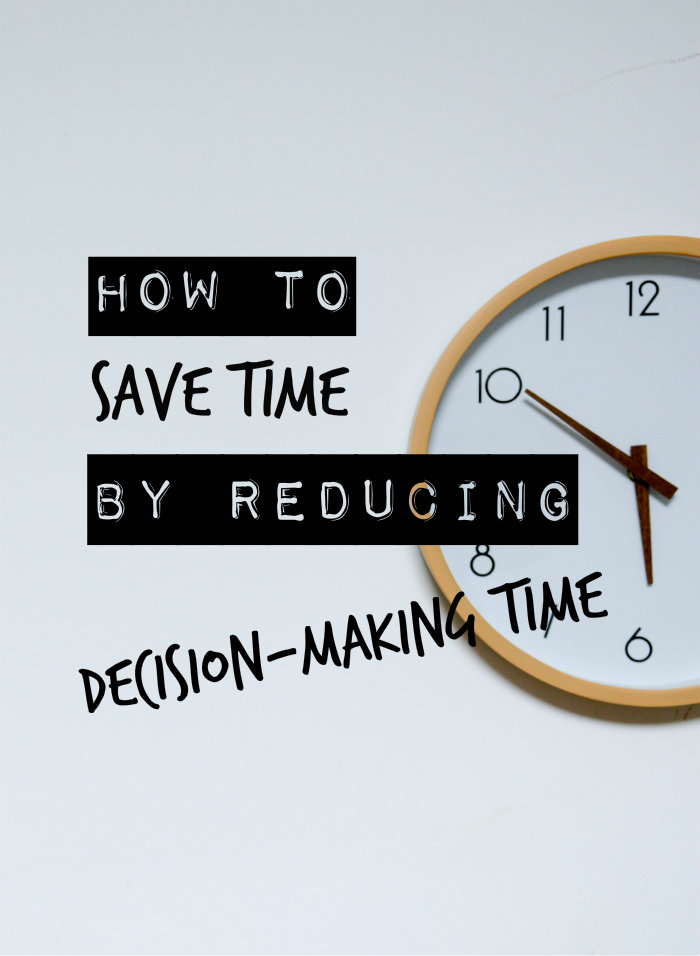Having enough time to do the things you want to do enhances your quality of life. Since you only have a set amount of time available, there’s no way to “gain time” – although this is an often used term. In fact, we’re all equal in the way that we all have the exact same amount of hours, minutes and seconds available in a day. But you can be considerate with how you make use of your time and use certain techniques to “save time.” One of these techniques is reducing the time you spend to make decisions.
The Concept: Reducing Decision-Making Time
You’re forced into making decisions on an everyday basis. Most of the time, you don’t even realize that you’re choosing between things and it happens quickly and without much thinking. In fact, it’s estimated that you make around 35,000 decisions every single day.
By cutting down on the time you spend making certain decisions (particularly the ones that cost you a lot of time), you can “save time” and energy for other, more important things. How can you do that? You can either “automate” decision making or limit the number of (perceived) choices by establishing some rules or seeking out sources that support you in your quest.
Examples Of Application Areas
Here are some examples that illustrate the idea of reducing decision-making time.
Wardrobe
You can either entertain the idea of a capsule wardrobe or just decide on and know the items, styles and colors that work for you. When it comes to buying new clothing, you can stick to what you determined to be your “style” (at least most of the time).
Shopping can get overwhelming if you don’t know what suits you and/or want to consider all the choices out there. If that’s you, you might want to invest in a stylist or image consultant who can give you tips and narrow down your wardrobe.
Diet
If you stick to a certain type of diet, you will drastically reduce decision-making time when it comes to grocery shopping or eating out. For instance, let’s say you’re eating a ketogenic diet or you focus on a whole foods approach, the food items you consider buying in a grocery store or in a regular restaurant will reduce dramatically.
Another example in this area would be to have the same breakfast every single day. If you don’t have to think about what you want for your first meal of the day (especially in the early hours of the day when our brains are still a little slow) can have a positive effect on your time.
(Having said all that, this is not a recommendation to change your diet or cut out entire food groups [especially if it’s done in an unhealthy way] for the sole purpose of cutting down on your time spent making decisions. It’s a mere example to illustrate the concept.)
Media Consumption
You can limit your news consumption to one or a few media outlets you trust. There’s no need to consume news around the clock from various different sources. If your goal with media consumption is to stay informed about what’s going on in the world, choose a couple sources and stick with them.
Firstly, most sources talk about the same topics – they just take a different angle at it. Depending on your world and/or political views you likely trust one source more than the other anyway.
Secondly, (and this is coming from someone with a background in Communication and Media Studies) what the news media outlets report on are not necessarily “the most important news”. It’s just the information they choose or were made to put out to the public. It’s NOT an accurate representation of what’s happening in the world. Far from it. Just my two cents.
Research
Think about how you do your everyday research. Whether it is seeking out and researching your new travel destination or looking for a new dentist. Instead of doing “groundwork”, consult sources and experts you trust and follow their recommendation.
Planning
Good planning is half the work done, or so the saying goes. If you plan well, you “only” have to execute on the plan. Having a great step-by-step plan in place greatly reduces decision-making and execution time.
Let’s say for example that you plan your day (or maybe even week) ahead. First, you decide on the tasks you want to work on. Then, you flesh out more specific steps within the tasks and schedule blocks of time. This helps you decrease “setup time” between tasks. You “just” have to execute on your work without thinking what’s coming next. You’re also less likely to get stuck if your plan is already fleshed out in great detail. Overall, the number of decisions you have to make will decrease if you have a great plan in place.
What other areas can you think of in which you could reduce decision-making time and how? Let me know in the comments below!
PIN IT:


